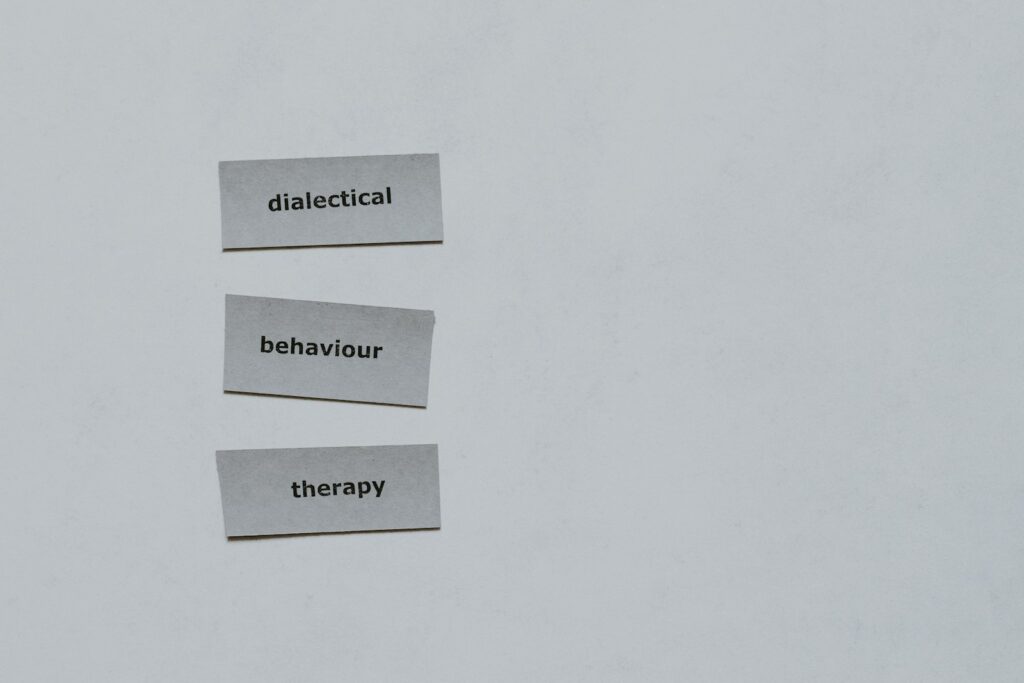Are you looking for DBT therapy in Arlington, VA?
Mental health challenges affect millions of people, yet finding the right therapeutic approach can feel overwhelming. If you’re searching for effective treatment that combines evidence-based techniques with compassionate care, Dialectical Behavior Therapy (DBT) might be the solution you’ve been seeking.
At Groundbreaker Therapy, Dr. Matthew G. Mandelbaum combines over 20 years of experience in DBT, trauma-informed care, and excellence in teaching and learning to help individuals overcome emotional barriers and build lasting resilience.
DBT focuses on assisting individuals in managing emotional difficulties, improving their interpersonal relationships, and developing coping skills to handle stress and emotional challenges, ultimately enhancing their lives. Whether you’re dealing with anxiety, PTSD, eating disorders, or life transitions, virtual DBT therapy offers accessible, personalized support that fits your schedule and lifestyle.
This comprehensive guide explores everything you need to know about DBT therapy in Arlington, including costs, treatment approaches, and how Dr. Mandelbaum’s unique expertise can help you create meaningful change in your life. DBT therapy can positively impact the lives of those seeking help for emotional difficulties, empowering them to achieve personal growth and balance.
Ready to Start Therapy?
Your healing journey can begin today. Fill out the form below to connect with a therapist who truly listens and understands.

Photo by Pawel Czerwinski on Unsplash
Understanding Dialectical Behavior Therapy: An Evidence-Based Approach Rooted in Cognitive Behavioral Therapy (CBT)
Dialectical Behavior Therapy (DBT) is an evidence-based form of cognitive behavioral therapy (CBT) that was developed to support individuals who experience intense emotional dysregulation and have difficulty using traditional coping strategies.
Created by psychologist Dr. Marsha Linehan, DBT expands on core CBT principles by incorporating mindfulness, distress tolerance, emotional regulation, and interpersonal effectiveness skills into a structured and holistic treatment model.
The term “dialectical” reflects DBT’s central focus: balancing two seemingly opposing ideas—acceptance and change. In DBT, this is often described as walking the “middle path,” a guiding principle that emphasizes finding balance between acceptance and change to achieve emotional stability and personal growth.
This balance helps individuals move away from all-or-nothing thinking and instead embrace growth while still honoring their current emotional experience.
Core Components of DBT Therapy
DBT therapy focuses on four essential skill areas that work together to promote emotional stability and healthier relationships:
Mindfulness forms the foundation of DBT, teaching individuals to observe their thoughts, emotions, and sensations without judgment. This skill helps create space between experiencing an emotion and reacting to it, allowing for more thoughtful responses to challenging situations.
Distress tolerance equips individuals with practical tools to survive crisis situations without making them worse through impulsive actions. These skills prove invaluable when facing overwhelming emotions or stressful circumstances that cannot be immediately changed.
Emotion regulation helps individuals understand, experience, and manage emotions more effectively. Rather than being controlled by intense feelings, clients learn to identify emotional triggers and develop healthy responses that align with their values and goals.
Interpersonal effectiveness teaches communication strategies that help individuals maintain relationships while honoring their own needs. DBT places a strong emphasis on improving interpersonal relationships, enabling individuals to build and sustain healthier connections with others. These skills prove particularly valuable for those who struggle with setting boundaries or expressing their needs clearly.

Photo by Markus Winkler on Unsplash
Benefits of DBT Therapy for Mental Health
Research consistently demonstrates DBT’s effectiveness across a wide range of mental health conditions. The therapy’s comprehensive approach addresses both the symptoms and underlying patterns that contribute to emotional distress.
For individuals with anxiety disorders, DBT provides practical tools for managing worry, panic, and social anxiety. The mindfulness component helps reduce the tendency to catastrophize, while distress tolerance skills offer concrete strategies for navigating anxious moments without avoidance behaviors.
Those experiencing post-traumatic stress disorder find particular benefit in DBT’s trauma-informed approach. The therapy helps individuals process traumatic experiences while building emotional resilience and healthy coping mechanisms. The integration of mindfulness and emotion regulation skills proves especially valuable for managing trauma responses.
DBT has shown remarkable success in treating eating disorders by addressing the underlying emotional dysregulation that often drives disordered eating behaviors. The therapy helps individuals develop a healthier relationship with food while building alternative coping strategies for managing difficult emotions.
For personality disorders, particularly borderline personality disorder, DBT offers hope and practical tools for creating stability in relationships and emotional experiences. DBT addresses the root causes of emotional and behavioral challenges, such as trauma or attachment wounds, through evidence-based and trauma-informed treatment.
The therapy’s non-judgmental approach helps reduce shame while building skills for more effective interpersonal interactions, including managing relationship conflict and emotional difficulties.
The 24-Hour Rule in DBT Therapy
One particularly powerful technique within DBT therapy is the 24-hour rule, which provides a structured approach to processing intense emotional experiences. This rule suggests waiting 24 hours before making important decisions or taking significant actions when experiencing overwhelming emotions.
The 24-hour rule recognizes that intense emotions, while valid and important, can cloud judgment and lead to impulsive decisions that individuals later regret. By creating a buffer period, this technique allows the emotional intensity to decrease while providing space for rational thinking to emerge.
Sarah, a young professional, discovered the power of this rule when dealing with workplace stress. Initially, her intense anxiety would lead to impulsive emails to her supervisor or colleagues that she later regretted. By implementing the 24-hour rule, Sarah learned to process her emotions first, then respond from a more balanced perspective. This simple technique dramatically improved her professional relationships and reduced her overall stress levels.
The practical application of this rule involves several steps. When experiencing intense emotions, individuals first acknowledge and validate their feelings without trying to immediately solve or fix the situation.
They then engage in healthy distress tolerance activities like mindfulness meditation, physical exercise, or creative expression. After 24 hours, they revisit the situation with a fresh perspective and make decisions based on both emotional wisdom and rational thinking.

Dr. Matthew G. Mandelbaum’s Approach to Dialectical Behavior Therapy (DBT) in Arlington, VA
Dr. Matthew G. Mandelbaum, a licensed psychologist with years of professional experience, is dedicated to providing compassionate and evidence-based dialectical behavior therapy (DBT) to individuals in Arlington, VA via telepsychology
With over two decades of practice, Dr. Mandelbaum specializes in helping highly sensitive, intelligent individuals navigate complex emotional challenges while building lasting resilience. His multifaceted approach may include weekly individual therapy to learn the skill sets to maintain mental well-being in stressful situations.
Dr. Mandelbaum can teach communication skills, mindfulness, and help manage potential stressful situations, ensuring comprehensive support for each client during their counseling sessions.
His approach integrates traditional DBT techniques with trauma-informed care, recognizing that many individuals seeking therapy have experienced various forms of trauma that impact their emotional regulation and relationships.
Dr. Mandelbaum’s clients consistently report feeling understood and supported throughout their therapeutic journey. As one client shared, “Dr. Mandelbaum has the uncanny ability to make me feel understood—like we travel on the same thought wavelength.” This connection forms the foundation for effective therapy, creating a safe space where individuals can explore difficult emotions and develop new coping strategies.
The personalized nature of Dr. Mandelbaum’s approach means that each client receives treatment tailored to their specific needs, circumstances, and goals. Whether working with business professionals managing career stress, students navigating academic pressures, or individuals processing trauma, the therapy adapts to meet each person where they are in their healing journey.
Disclaimer: Groundbreaker Therapy does NOT provide group therapy sessions, art therapy, intensive outpatient treatment, family therapy, partial hospitalization services, or day treatment services. If you find yourself needing these services, please visit Psychology Today to find another provider.
Virtual Dialectical Behavioral Therapy: Accessibility and Convenience
Virtual DBT therapy through Groundbreaker Therapy offers unprecedented accessibility for individuals seeking high-quality mental health treatment. Dr. Mandelbaum provides telepsychology services across 43 states, breaking down geographical barriers that might otherwise prevent access to specialized care.
The convenience of virtual sessions eliminates common obstacles to consistent therapy attendance, such as transportation challenges, scheduling conflicts, or mobility limitations. Clients can engage in therapy from the comfort and privacy of their own homes, which often promotes greater openness and reduces anxiety about seeking mental health support.
John’s experience illustrates the transformative power of virtual DBT therapy. Living in a rural area with limited local mental health resources, John struggled with mood disorders that significantly impacted his daily life.
Through virtual sessions with Dr. Mandelbaum, he gained access to specialized DBT treatment that would have been impossible to receive locally. The convenience of virtual sessions allowed him to maintain consistent therapy attendance while managing work and family responsibilities.
Virtual DBT therapy maintains the same effectiveness as in-person treatment while offering additional benefits. The familiar environment of home can help individuals feel more relaxed and open during sessions. Additionally, the flexibility of virtual appointments often allows for more consistent therapy attendance, which is crucial for DBT’s skill-building approach.

Photo by Alysha Rosly on Unsplash
Therapy Session Structure: What to Expect in Your DBT Journey
When you begin DBT therapy in Arlington, VA, you can expect each session to be thoughtfully structured to support your mental health and personal growth.
Sessions typically start with a check-in, allowing you to share recent experiences and set the tone for the meeting. Together with your therapist, you’ll review your experiences with tools for tracking thoughts, emotions, behaviors, and the use of DBT skills throughout the week.
The focus then shifts to specific areas such as distress tolerance, emotional regulation, or interpersonal effectiveness, depending on your current needs and goals. Your therapist may introduce mindfulness-based interventions or cognitive behavioral techniques, ensuring that each session is grounded in evidence-based therapies.
Throughout the process, you’ll receive feedback, encouragement, and practical guidance, helping you build confidence in your ability to manage mental health challenges. This supportive, non-judgmental environment empowers you to develop new coping strategies and make meaningful progress in your DBT journey.
Understanding That Doing “The DBT Therapy Work” Costs and Should Be Considered an Investment
Many individuals seeking DBT therapy naturally want to understand the financial investment involved. While Groundbreaker Therapy operates as a private-pay practice outside of insurance networks, this model allows for personalized, premium care without the limitations often imposed by insurance requirements.
Committing to DBT therapy is an investment in your mental health, emotional well-being, and overall quality of life. While the financial cost of therapy can be a concern, it’s important to recognize the long-term value of developing essential skills like emotional regulation, distress tolerance, and interpersonal effectiveness.
These skills not only help you navigate current mental health challenges but also contribute to positive outcomes such as improved relationships, greater self-esteem, and enhanced resilience in everyday life.
The benefits of DBT therapy often extend far beyond the therapy room, supporting lasting change and personal growth. When weighing the cost, consider the potential impact of untreated mental health issues, such as increased stress, strained relationships, and reduced productivity.
The cost of DBT therapy varies based on several factors, including session frequency, treatment duration, and individual needs. Dr. Mandelbaum’s extensive experience and specialized expertise reflect the premium nature of the services provided. Many clients find that the concentrated, effective approach leads to meaningful results in a reasonable timeframe, making it a valuable investment in their long-term well-being.
Although Groundbreaker Therapy doesn’t directly bill insurance, many health insurance plans offer 50-80% reimbursement for out-of-network therapy services. The practice provides documentation necessary for insurance reimbursement, helping clients maximize their mental health benefits while accessing specialized care.
The true value of DBT therapy extends far beyond the immediate cost. For example, a trauma survivor, we must keep unnamed, found that her integrated DBT and trauma-informed care with Dr. Mandelbaum not only addressed her PTSD symptoms but also improved her overall quality of life. The skills she learned continue to benefit her years after treatment, representing a lasting return on her initial investment.
By viewing DBT therapy as a purposeful investment in yourself, you can approach the process with commitment and optimism, knowing that the rewards include a more balanced, fulfilling, and meaningful life.
Conditions Treated with DBT at Groundbreaker Therapy
DBT therapy at Groundbreaker Therapy effectively addresses a comprehensive range of mental health challenges. The therapy’s versatile approach makes it particularly effective for individuals who have found limited success with other treatment modalities.
Post-traumatic stress disorder benefits significantly from DBT’s trauma-informed approach. The therapy helps individuals process traumatic experiences while building emotional resilience and practical coping skills. The mindfulness component proves particularly valuable for managing intrusive thoughts and emotional flashbacks.
Anxiety disorders, including generalized anxiety, social anxiety, and panic disorder, respond well to DBT’s emotion regulation and distress tolerance skills. Clients learn to navigate anxious thoughts and sensations without being overwhelmed or controlled by them.
Eating disorders often involve complex emotional dysregulation that DBT addresses effectively. The therapy helps individuals develop healthier relationships with food while building alternative coping strategies for managing difficult emotions.
Personality disorders, particularly borderline personality disorder, show remarkable improvement with DBT treatment. The therapy’s comprehensive approach addresses the emotional instability, relationship difficulties, and identity issues often associated with these conditions.
Mood disorders and significant life transitions benefit from DBT’s focus on emotional regulation and interpersonal effectiveness. Whether dealing with depression, bipolar disorder, or major life changes, individuals learn skills for managing emotional fluctuations and maintaining stability.
Frequently Asked Questions About DBT Therapy
How much do DBT programs cost per session?
DBT therapy costs vary based on individual needs and treatment plans. As a private-pay practice, Groundbreaker Therapy provides premium, personalized care. While costs reflect Dr. Mandelbaum’s extensive expertise, many insurance plans offer significant reimbursement for out-of-network services, and documentation is provided to facilitate this process.
Is DBT therapy covered by insurance?
While Groundbreaker Therapy doesn’t directly bill insurance companies, many health insurance plans provide 50-80% reimbursement for out-of-network mental health services. The practice provides all necessary documentation to help clients maximize their insurance benefits while accessing specialized care.
What makes Groundbreaker Therapy unique?
Dr. Mandelbaum’s 20+ years of experience, combined with his integration of DBT and trauma-informed care, create a uniquely effective therapeutic approach. The practice serves clients across 43 states through both virtual and in-person sessions, providing unprecedented accessibility to specialized care.
Take the Next Step Toward Emotional Wellness & You Don’t Even Have To Go In-Person!
DBT therapy offers hope and practical tools for individuals struggling with emotional challenges, relationship difficulties, and life transitions. Dr. Mandelbaum’s expertise in combining DBT with trauma-informed care creates a comprehensive approach that addresses both symptoms and underlying causes of emotional distress. If you’re considering starting DBT or another therapy modality, you can learn what to expect at your therapy appointment to make the most of your session.
The accessibility of virtual sessions means that geographic location no longer needs to be a barrier to receiving high-quality mental health care. Whether you’re dealing with anxiety, PTSD, eating disorders, or simply seeking better emotional regulation skills, DBT therapy can provide the tools and support you need to create lasting positive change.
Your emotional well-being deserves expert attention and personalized care. The skills you’ll learn through DBT therapy extend far beyond the therapy room, creating lasting improvements in your relationships, career, and overall life satisfaction.
Don’t let another day pass feeling overwhelmed by intense emotions or stuck in unhelpful patterns. Book a consultation today with Dr. Mandelbaum at Groundbreaker Therapy and take the first step toward emotional freedom and resilience. Your journey toward a more balanced, fulfilling life can begin with a single phone call.
Mental Health Resources
- National Alliance on Mental Illness (NAMI): Offers education, support groups, and a helpline for individuals and families affected by mental illness.
- Mental Health America (MHA): Provides mental health screenings, advocacy resources, and educational content.
- Substance Abuse and Mental Health Services Administration (SAMHSA): National resources for substance use and abuse treatment options, research, and a 24/7 helpline: 1-800-662-HELP (4357).
- The Trevor Project: Crisis intervention and suicide prevention services for LGBTQIA+ youth.
- Headspace: A meditation and mindfulness app with resources for stress, sleep, and anxiety.
- Crisis Text Line: Free, 24/7 support via text for people in crisis. Text HOME to 741741.
- Veterans Crisis Line: Confidential help for veterans and their families. Call 988 then press 1 or text 838255.
- RAINN (Rape, Abuse & Incest National Network): Support and resources for survivors of sexual violence. 24/7 hotline: 800-656-HOPE (4673).
- National Suicide Prevention Lifeline (now 988 Suicide & Crisis Lifeline): Call or text 988 for free, confidential crisis support 24/7.


